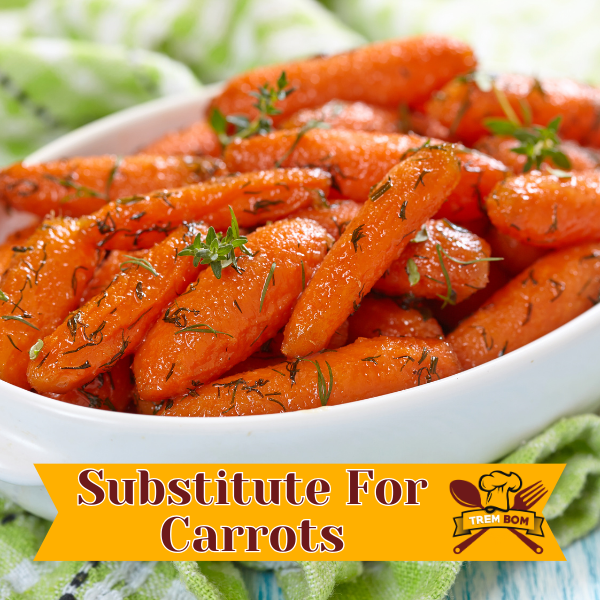
Carrots are a popular vegetable known for their vibrant color, sweet flavor, and numerous health benefits. However, if you’re looking to switch things up in the kitchen or need a substitute due to allergies or personal preference, there are plenty of fantastic options to explore. From root vegetables to leafy greens, you’ll find a variety of tasty and nutritious alternatives that can elevate your dishes to new heights.
In this article, we’ll delve into the world of carrot substitutes and introduce you to a range of vegetables that can be used as flavorful alternatives. Whether you’re looking to add diversity to your recipes or simply need a healthy replacement, these options will offer exciting new possibilities. Let’s get started!
Key Takeaways:
- There are numerous delicious and healthy substitutes for carrots.
- These alternatives can be used to add diversity and unique flavors to your dishes.
- Root vegetables, leafy greens, cruciferous vegetables, and fruits can all serve as excellent carrot substitutes.
- Experimenting with vegetable swaps can provide new culinary experiences and cater to different dietary needs.
- By following our tips and tricks, you can successfully incorporate carrot alternatives into your favorite recipes.
Why Look for Carrot Alternatives?
Before we dive into the specific substitutes, let’s explore the reasons why you might be seeking alternatives to carrots. Whether you’re allergic, find carrots too sweet, or want to experiment with different flavors and textures, there are plenty of valid reasons to explore vegetable swaps for carrots.
Vegetable Swaps for Carrots
Are you looking for nutritious and flavorful alternatives to carrots in your recipes? Look no further! We’ve got you covered with a variety of vegetable swaps that will not only bring a unique taste and appearance to your dishes but also add a burst of color and flavor. Whether you’re allergic to carrots or simply want to explore new flavors, these substitutes offer a delicious way to keep your recipes exciting.
Root Vegetables
Root vegetables are a great category to consider when looking for carrot substitutes. Not only do they offer a similar earthy and hearty flavor profile, but they also add their own distinctive qualities to your dishes. Take a look at these top root vegetable options:
- Beets: Their vibrant color and natural sweetness make them a perfect replacement for carrots in salads and side dishes.
- Parsnips: With their sweet and nutty flavor, parsnips can be roasted or mashed as a delicious alternative to carrots.
- Turnips: These versatile vegetables can be used in soups, stews, and even roasted to provide a similar texture to carrots.
Leafy Greens
Leafy greens not only add vibrant color to your dishes but also offer different textures and nutritional profiles. Consider these leafy green options when substituting for carrots:
- Kale: This nutrient-packed green can be chopped and added to salads or sautéed as a side dish.
- Swiss Chard: With its mild and slightly bitter taste, Swiss chard can be used in stir-fries, soups, or even as a wrap.
- Collard Greens: These sturdy greens can be steamed, braised, or sautéed as a substitute for carrots in a variety of recipes.
Cruciferous Vegetables
Cruciferous vegetables provide additional options for replacing carrots in your recipes. Known for their unique flavor and high nutrient content, consider incorporating these cruciferous vegetables:
- Broccoli: Roasted or steamed, broccoli adds a crunchy texture and subtly sweet taste to your dishes.
- Cauliflower: With its mild flavor, cauliflower can be used as a nutritious and versatile alternative to carrots in various recipes.
- Cabbage: Whether lightly sautéed or pickled, cabbage offers a crisp texture and subtle sweetness that complements many dishes.
These are just a few examples of the many vegetable substitutes available for carrots. Get creative in the kitchen and experiment with different combinations to discover exciting new flavors. Who knows, you might even stumble upon a new favorite ingredient! So, don’t hesitate to try these vegetable swaps and unlock a world of culinary possibilities without carrots.
Root Vegetable Options
When looking for carrot replacement options, root vegetables offer a fantastic variety of flavors and textures to elevate your dishes. These creative swaps for carrots will add an earthy and hearty essence to your recipes while bringing their own unique qualities. Let’s explore some of the best root vegetable options to replace carrots:
1. Parsnips
A close relative of carrots, parsnips offer a sweet and nutty flavor that adds depth to soups, stews, and roasted vegetable medleys. They have a similar texture to carrots, making them an ideal substitute in recipes that call for grated or diced carrots.
2. Turnips
Turnips can provide a slightly peppery and earthy taste that complements a variety of dishes. They work well in roasted vegetable medleys, stir-fries, and gratins. Their firm and crunchy texture adds a delightful contrast to your culinary creations.
3. Rutabagas
Rutabagas, also known as swedes, have a lovely balance of sweetness and peppery notes, making them an interesting alternative to carrots. They can be roasted, mashed, or used in soups and stews to bring a unique flavor to your recipes.
4. Sweet Potatoes
Sweet potatoes are widely loved for their natural sweetness and vibrant orange color. They are a popular choice for both savory and sweet dishes, providing a rich and creamy texture. Sweet potatoes can be roasted, mashed, or even used in desserts as a carrot replacement.
5. Beets
Beets offer a distinctively earthy and slightly sweet flavor, bringing a vibrant hue to your dishes. They can be roasted, steamed, or even grated raw to add color and complexity to salads, grain bowls, and side dishes. Beets are a versatile root vegetable that can spice up your carrot-free recipes.
These root vegetable options not only offer delicious alternatives to carrots but also provide their own nutritional benefits. They are packed with vitamins, minerals, and fiber, making them a wholesome addition to your meals. Experiment with these creative swaps for carrots to add depth and variety to your culinary repertoire.
| Root Vegetable | Taste Profile | Texture | Best Used In |
|---|---|---|---|
| Parsnips | Sweet and nutty | Similar to carrots | Roasted vegetables, soups, stews |
| Turnips | Peppery and earthy | Firm and crunchy | Roasted vegetable medleys, stir-fries, gratins |
| Rutabagas | Sweet and peppery | Firm and slightly fibrous | Roasted dishes, soups, stews |
| Sweet Potatoes | Naturally sweet | Soft and creamy | Roasted, mashed, desserts |
| Beets | Earthy and slightly sweet | Firm when cooked, crunchy when raw | Salads, grain bowls, side dishes |
Leafy Greens as Carrot Alternatives
Looking for alternatives to using carrots? Leafy greens offer a fantastic option to replace carrots in your recipes. These vibrant and nutrient-packed vegetables not only add a pop of color to your dishes but also provide a unique texture and flavor profile.
When it comes to vegetable substitutes for carrots, leafy greens are a versatile choice. They can easily be incorporated into a variety of recipes, from salads to stir-fries, soups, and even smoothies. Whether you’re looking for a tasteful twist or seeking to add more greens to your diet, leafy greens can be an excellent choice.
Here are some of the best leafy green options to consider when replacing carrots in your recipes:
- Kale: Known for its sturdy texture and earthy flavor, kale is a nutrient powerhouse and an excellent substitute for carrots. It adds a deep green color and can be used in salads, sautés, or as a substitute for carrot ribbons in dishes like coleslaw.
- Spinach: With its delicate and tender leaves, spinach offers a milder taste that pairs well with a wide range of flavors. Whether you’re making a smoothie, pasta, or creamed spinach, it can bring a vibrant and nutritious element to your dishes.
- Swiss Chard: This leafy green features colorful stems and large, tender leaves. It has a slightly sweet and earthy flavor, making it a suitable replacement for carrots in stir-fries, quiches, or as a wrap for vegetable fillings.
- Collard Greens: Collard greens have sturdy and thick leaves, providing a satisfying crunch and a slightly bitter taste. They can be used as a wrap for sandwiches or as a substitute for carrot greens in recipes like pesto or tabbouleh.
These leafy greens not only offer alternative flavors but also bring their own set of health benefits. Rich in vitamins, minerals, and dietary fiber, they can contribute to a well-rounded and nutritious diet. Incorporating leafy greens as carrot substitutes allows you to experiment with different tastes and textures while maintaining a vibrant and wholesome dish.
Adding leafy greens to your recipes not only provides a refreshing change but also boosts the nutritional value of your meals. Swap out carrots for kale, spinach, Swiss chard, or collard greens, and indulge in a colorful and nutrient-rich culinary experience.
Cruciferous Vegetables to Replace Carrots
When it comes to finding creative swaps for carrots in your recipes, don’t overlook the delicious and nutritious cruciferous vegetables. These veggies not only offer a unique flavor but also bring a wealth of health benefits to your meals.
Cruciferous vegetables like broccoli, cauliflower, and Brussels sprouts are excellent alternatives to carrots. Their slightly bitter and mildly earthy taste adds depth and complexity to a variety of dishes. Plus, they are packed with nutrients such as vitamins C, K, and folate, making them a fantastic choice for carrot-free recipes.
Here are a few popular cruciferous vegetables that you can incorporate into your meals:
- Broccoli: Known for its vibrant green color and crunchy texture, broccoli is a versatile vegetable that can be used in stir-fries, soups, salads, and more. It pairs well with a wide range of flavors and can bring a satisfying crunch to your dishes.
- Cauliflower: With its mild flavor and versatile texture, cauliflower is a fantastic substitute for carrots in recipes like mashed potatoes, rice, and even pizza crust. You can steam, roast, or mash it to create a creamy and nutritious alternative.
- Brussels Sprouts: These tiny, cabbage-like vegetables are packed with flavor and offer a slightly sweet and nutty taste. Roasting or sautéing Brussels sprouts brings out their natural caramelized flavors, making them an excellent addition to any carrot-free recipe.
By incorporating cruciferous vegetables into your cooking, you can enjoy a variety of carrot-free recipes that are both delicious and nutritious. Experiment with different cooking methods, seasonings, and combinations to discover your new favorite dishes.
Other Creative Alternatives
In this section, we will introduce you to some unique and inventive substitutes for carrots that you may not have thought of before. If you’re feeling adventurous and looking for a twist to your recipes, these creative swaps for carrots will spark your culinary imagination. From lesser-known vegetables to unexpected ingredients, get ready to explore a world of alternatives that will take your dishes to the next level.
Unconventional Vegetable Swaps
If you’re searching for a vegetable alternative to carrots, consider these surprising options:
- Parship: With its sweet and nutty flavor, parsnip can be an excellent replacement for carrots. It adds a subtle richness and complements a wide range of dishes.
- Kohlrabi: This unique and versatile vegetable offers a satisfying crunch and a mild, sweet flavor. Try using thinly sliced kohlrabi as a substitute for carrot sticks, or grate it to add texture and freshness to your salads.
- Jicama: Known for its crispness and refreshing taste, jicama is a wonderful alternative to carrots in salads and slaws. Its slightly sweet flavor and juicy texture will bring a delightful change to your dishes.
Unexpected Ingredients
Looking for something truly unconventional? Consider these out-of-the-box options:
- Radish: Radishes might not be your first thought when seeking an alternative to carrots, but their peppery flavor and vibrant color can add a unique twist to your recipes. Try slicing or grating them as a substitute in salads, stir-fries, or garnishes.
- Sweet Potato: While it may not be as surprising as some other alternatives, sweet potatoes offer a similar earthy sweetness and can be used in various carrot-based recipes. Whether roasted, mashed, or baked, their creamy texture and rich flavor will make your dishes shine.
- Mango: If you’re looking to replace the sweetness and vibrant color of carrots, consider using mango in certain recipes. Its tropical flavor and juicy texture can work exceptionally well in salads, salsas, or even as a puree in baked goods.
Get creative in the kitchen and experiment with these unexpected alternatives to using carrots. By embracing a diverse range of ingredients, you’ll enhance the flavors and add excitement to your culinary repertoire.
Using Fruits as Carrot Replacements
Sometimes, when looking for alternatives to carrots, fruits can be surprisingly versatile substitutes. Not only do they offer a similar sweetness, but they can also add unique flavors and textures to your dishes. Here are a few fruits that can mimic the qualities of carrots, allowing you to create carrot-free recipes that still deliver on taste and balance.
Mango
Mangoes are a tropical fruit known for their vibrant color and juicy sweetness. When used as a carrot replacement, they bring a delightful burst of flavor to salads, stir-fries, and even baked goods. Their natural sweetness can complement savory dishes, creating a harmonious blend of flavors.
Peaches
Peaches offer a slightly tart and aromatic profile, making them an excellent alternative to carrots in certain recipes. Their soft texture and fruity taste work well in various dishes, such as salsas, chutneys, and desserts. Incorporating peaches into your recipes can add a touch of brightness and complexity.
Butternut Squash
Butternut squash, although technically a fruit, has a mild sweetness similar to carrots and a creamy texture that lends itself well to soups, stews, and roasted dishes. Its rich flavor can replace carrots in many recipes, bringing depth and warmth to your meals.
Remember, experimenting with fruit substitutes for carrots opens up a world of culinary possibilities. The key is to consider the flavor, texture, and nutritional qualities of the fruit in relation to your recipe. Enjoy the process of discovering unique combinations and savor the results of your carrot-free creations!
Tips for Cooking with Carrot Substitutes
When incorporating carrot substitutes into your recipes, it’s important to consider a few key factors to ensure the best results. Here are some tips and tricks for cooking with these healthy alternatives and preparing delicious carrot-free dishes:
1. Cooking Times:
Carrot substitutes may have different cooking times compared to carrots. Be mindful of these variations and adjust your cooking times accordingly to avoid overcooking or undercooking the substitutes. For example, root vegetables like parsnips or sweet potatoes may take longer to cook than carrots, so plan accordingly.
2. Flavor Pairings:
Experiment with different flavor combinations to enhance the taste of your carrot substitutes. While carrots have a slightly sweet and earthy flavor, substitutes like turnips or celeriac have their own unique tastes. Consider pairing them with herbs and spices that complement their flavors and create a well-rounded dish.
3. Texture Considerations:
Carrot substitutes may have different textures compared to carrots. Some alternatives, like zucchini or squash, have a higher water content, so be mindful of this when incorporating them into your recipes. Adjust the cooking techniques and times accordingly to achieve the desired texture and avoid excessively watery dishes.
4. Nutritional Balance:
Take into account the nutritional properties of your chosen carrot substitutes. While carrots are known for their rich beta-carotene content, other vegetables may offer different essential nutrients. Ensure you maintain a balanced and nutritious diet by incorporating a variety of vegetables into your carrot-free recipes.
5. Experiment and Adapt:
Don’t be afraid to experiment with different carrot substitutes in your favorite recipes. Try out various options and adapt them to suit your taste preferences and dietary needs. Mix and match substitutes to create unique and flavorful dishes that showcase the versatility of these healthy alternatives.
“Cooking with carrot substitutes opens up a world of culinary possibilities. Embrace the chance to explore new flavors and textures, and you’ll be rewarded with delicious and nutritious dishes!”
With these tips in mind, you’re now equipped to confidently cook with carrot substitutes. Get creative in the kitchen and enjoy the journey of discovering healthy alternatives that will add a fresh twist to your carrot-free recipes!
Conclusion
As we conclude our exploration of substitutes for carrots, we hope you have found inspiration and confidence to experiment with various vegetable swaps. Whether you’re looking for a healthier alternative or simply want to try something new, these substitutes will add excitement and versatility to your culinary creations.
By replacing carrots with different vegetables such as root vegetables, leafy greens, or cruciferous vegetables, you can bring unique flavors, textures, and colors to your dishes. Don’t be afraid to get creative and explore the diverse world of vegetable substitutes for carrots.
From hearty stews to vibrant salads, carrot-free recipes can still be delicious and nutritious. Start incorporating these substitutes into your favorite dishes and discover a whole new culinary horizon. Remember, the key is to experiment and have fun in the kitchen as you create carrot-free recipes that satisfy your taste buds and suit your dietary preferences. Enjoy the journey of exploring new flavors and techniques with these versatile alternatives.
FAQ
What are some healthy and tasty substitutes for carrots?
There are several vegetable swaps that can be used as alternatives to carrots. Some options include sweet potatoes, parsnips, and butternut squash. These vegetables offer a similar earthy flavor and can be used interchangeably in recipes that call for carrots.
Why would someone look for carrot alternatives?
There are many reasons why someone might seek alternatives to carrots. Some individuals may have allergies or sensitivities to carrots, while others simply prefer different flavors and textures. Additionally, exploring vegetable substitutes allows for greater recipe diversity and experimentation.
What are some vegetable swaps for carrots?
If you’re looking for vegetable substitutes for carrots, consider options such as celery, jicama, or radishes. These alternatives offer a crunchy texture and can add a unique taste to dishes while replacing the color and nutritional benefits of carrots.
Can root vegetables be used as substitutes for carrots?
Yes, root vegetables can be excellent replacements for carrots in recipes. Vegetables like turnips, beets, and rutabagas can provide a similar earthy and hearty flavor profile while adding their own distinctive qualities to your dishes.
What are some leafy greens that can replace carrots?
Leafy greens such as spinach, kale, and Swiss chard can be used as alternatives to carrots. These vegetables not only provide a vibrant color but also offer a different texture and nutritional profile. They can be cooked or used raw in salads, stir-fries, or soups.
What are some cruciferous vegetables that can replace carrots?
Cruciferous vegetables like broccoli, cauliflower, and Brussels sprouts can serve as excellent alternatives to carrots. These vegetables have their own unique flavor and are packed with nutrients, making them a healthy and flavorful substitute in various recipes.
Are there any other creative substitutes for carrots?
Yes, there are plenty of unusual but creative substitutes you can use in place of carrots. Consider using ingredients like daikon radish, kohlrabi, or even zucchini ribbons as unique replacements. These options can bring a twist to your recipes and inspire culinary innovation.
Can fruits be used as carrot replacements?
While less common, certain fruits can serve as suitable replacements for carrots in specific recipes. Fruits like mango, persimmon, or apricot can mimic the sweetness and texture of carrots, allowing you to create dishes that satisfy your taste buds while still achieving the desired flavor balance.
What tips can help when cooking with carrot substitutes?
When cooking with carrot substitutes, it’s essential to consider cooking times and flavor pairings. Some vegetables may require shorter or longer cooking times than carrots, so be sure to adjust accordingly. Additionally, experiment with different herbs, spices, and seasonings to enhance the flavors of your dishes.
How can I make the most of my carrot-free recipes?
To make the most of your carrot-free recipes, embrace the opportunity for creativity and exploration. Don’t be afraid to try new combinations of vegetables, experiment with different cooking methods, and incorporate a variety of flavors. Enjoy the diverse world of vegetable substitutes for carrots!






